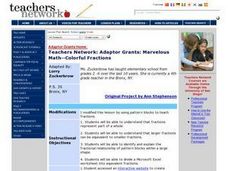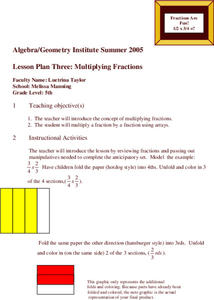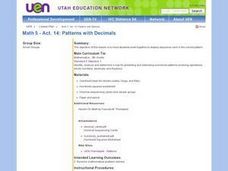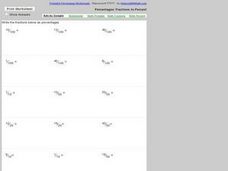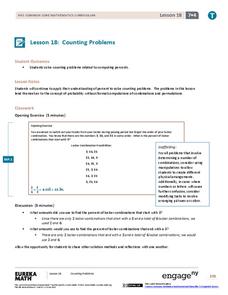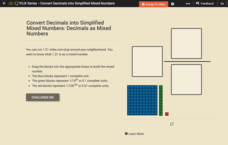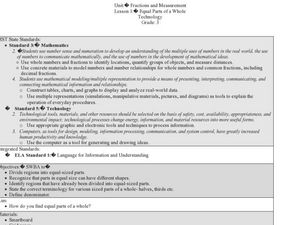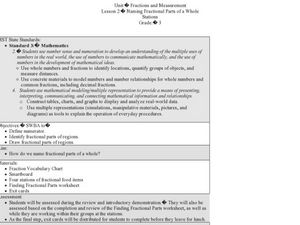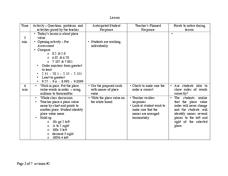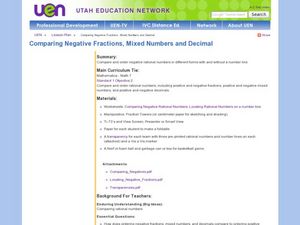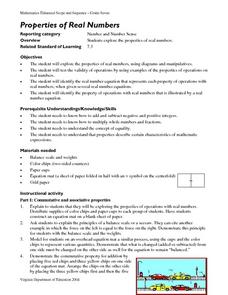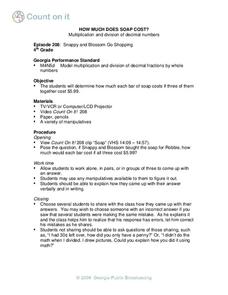Curated OER
Comparing Fractions
Students use the assistance of computers to explore reducing fractions. Using various internet activities, students experience comparing and ordering fractions. They develop methods to estimate the value of fractions.
Curated OER
Introduction to Fractions on the Numberline
Students use color-cued fraction strips and a color-cued numberline to develop basic fraction concepts and correct sequencing. They complete a worksheet using equivalent fractions to solve the problems.
Curated OER
Marvelous Math -- Colorful Fractions
Pupils begin the lesson by discovering that a fraction is one part of a whole. In groups, they practice reducting larger fractions into small fractions and discovering they are equal. They use blocks to identify the relationship...
Curated OER
Multiplying Fractions
Fifth graders explore the multiplication of fractions. Using paper folds, 5th graders observe multiplying by a fraction. They extrapolate multiplication problems from studying a written graphic.
Curated OER
Patterns with Decimals
Fifth graders are given a set of manipulatives to use to develop patterns. In groups, they follow the directions to determine which blocks go with which pattern and put them into the correct sequence. To end the lesson, they complete a...
Curated OER
Percentages: Fractions To Percent
In this percentages worksheet, students write eighteen fractions as percentages. Students problem solve each fraction as a percentage.
EngageNY
Creating Division Stories
Create your own adventure story ... well, not really. The fifth lesson in a 21-part series has pairs create story contexts for division problems. The lesson presents a step-by-step process for pupils to follow in writing such stories.
EngageNY
Counting Problems
Solving these percent problems is a matter of counting. Pupils find percents by counting the number of events that meet the criteria and the total number of possibilities. Participants create the ratio and convert it to a percent to...
CK-12 Foundation
Decimals as Mixed Numbers
Five questions—multiple-choice, true or false, and a discussion—make up an interactive that focuses on decimals as mixed numbers. Moveable blocks assist scholars in finding solutions.
Curated OER
Comparing Fractions
Fifth graders differentiate between large and small fractions using drawings to represent the value. The lesson includes written dialogue for teachers tell students. The author recommends the use of fraction tiles for manipulatives.
Curated OER
Fractions and Measurement
Using a Smart Board, or a plain ol' white board or chalkboard, the teacher pulls up a grid and demonstrates how squares and rectangles can be divided up into equal parts. The class will get their own graph paper to draw shapes and divide...
Curated OER
Adding Mixed Numbers - Unequal Denominators
Working with fractions that have unequal denominators is one of the most difficult concepts for young mathematicians to master. Here you will find a fine lesson plan that should help youngsters begin to get a grasp on this important...
Curated OER
Naming Fractional Parts of a Whole
Third graders complete a worksheet. In this fractions lesson plan, 3rd graders review fraction vocabulary, use the SmartBoard to divide fractions and complete stations where they work with fractional parts of a whole.
Curated OER
Place Value
Practice place value skills with this lesson. Learners put numbers in order from greatest to least, identify the values of particular numbers, and engage in an activity to compare numbers using manipulatives.
Curated OER
Comparing Negative Fractions, Mixed Numbers and Decimal
Seventh graders explore the concept of negative rational numbers. In this negative rational numbers lesson, 7th graders discuss similarities between positive and negative rational numbers. Students predict what rational numbers lie...
Curated OER
Inequality and the 1/2 Benchmark
Fourth graders utilize fraction bar manipulatives to compare a variety of fractions to the fraction value 1/2. Pupils are put into groups, and they begin to see how fractions that look completely different actually represent the same...
Curated OER
Skittles Galore!
Youngsters show understanding of accurate division of whole number, decimals, fractions, and percents using manipulatives (candies). They use white boards to demonstrate their understanding of representing numbers as defined in the...
Curated OER
Solving Problems Involving Subtraction
Here is an excellent lesson plan on solving subtraction word problems using fractions and mixed numbers. Learners complete three activities that will help them to explore and better-understand the world of mixed numbers. Fraction bars...
Virginia Department of Education
Properties of Real Numbers
Students use paper cups and colored chips to observe properties of operations with real numbers. As a class, students brainstorm and use manipulatives to demonstrate associative, commutative, distributive identity and inverse properties....
Curated OER
How Much Does Soap Cost?
Explore multiplication and division using real life problems, including how to find the cost of soap per bar. Individuals or small groups work to find answers. They then share with the class how they found their answer.
Benjamin Franklin High School
Saxon Math: Algebra 2 (Section 3)
In this third of a twelve-part series, the focus moves from using matrices to solving systems of equations with substitution and elimination, including more than two dimensions and variables in equations, and analyzing statistical data....
Curated OER
Dividing into Two Parts — Halves
In this fractions learning exercise, students divide pictures into halves to introduce them to fractions. Students complete 3 sets of problems.
Curated OER
What's My Ratio?
Students investigate ratios of various objects. In this ratios of various objects instructional activity, students draw pictures on graph paper and then dilate or shrink the image. Students determine the ratio of their...
Curated OER
Fraction Manipulatives
In these fraction worksheets, 5th graders use the fraction manipulatives to help them learn and visualize fractions. Students then solve 5 fraction problems.


